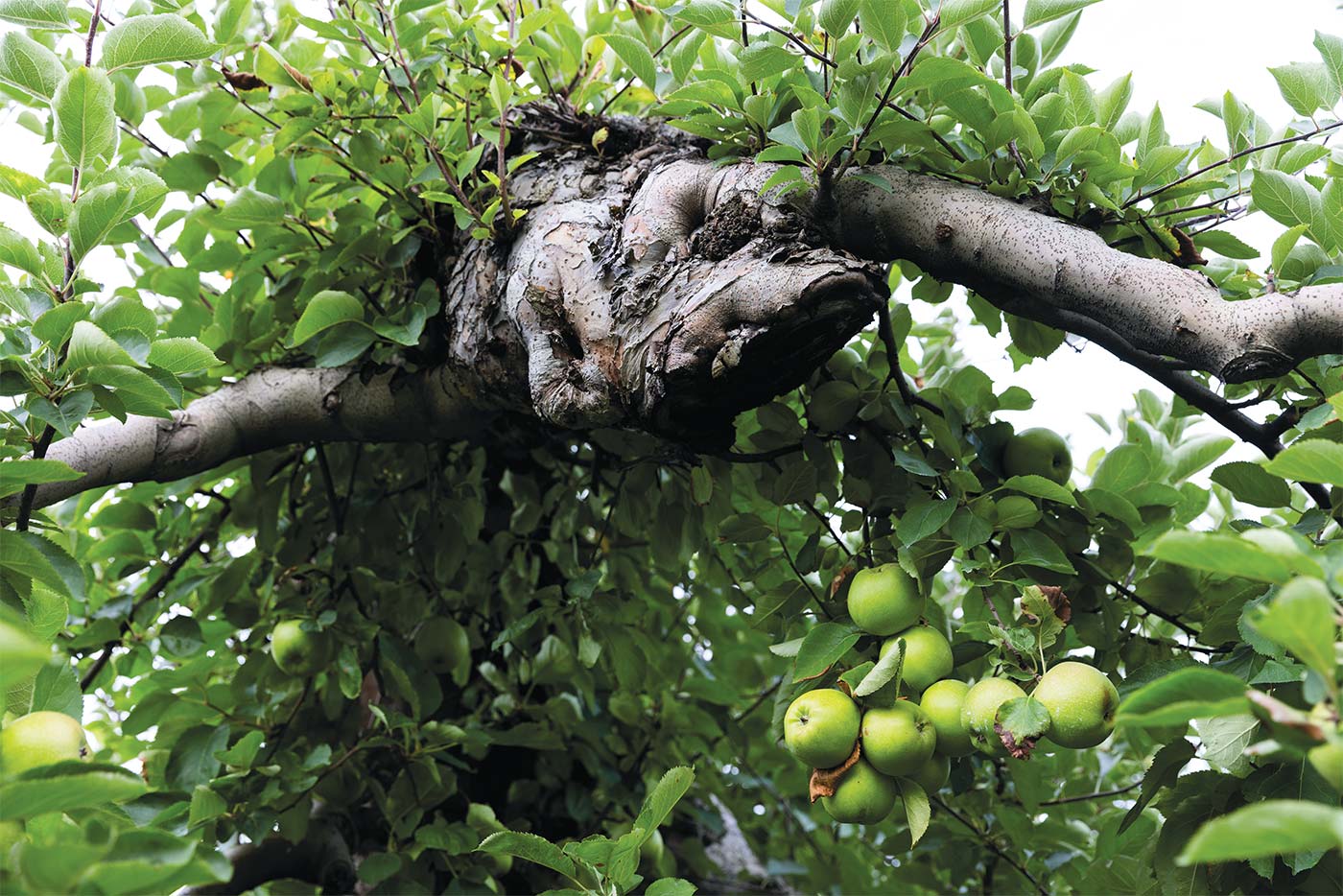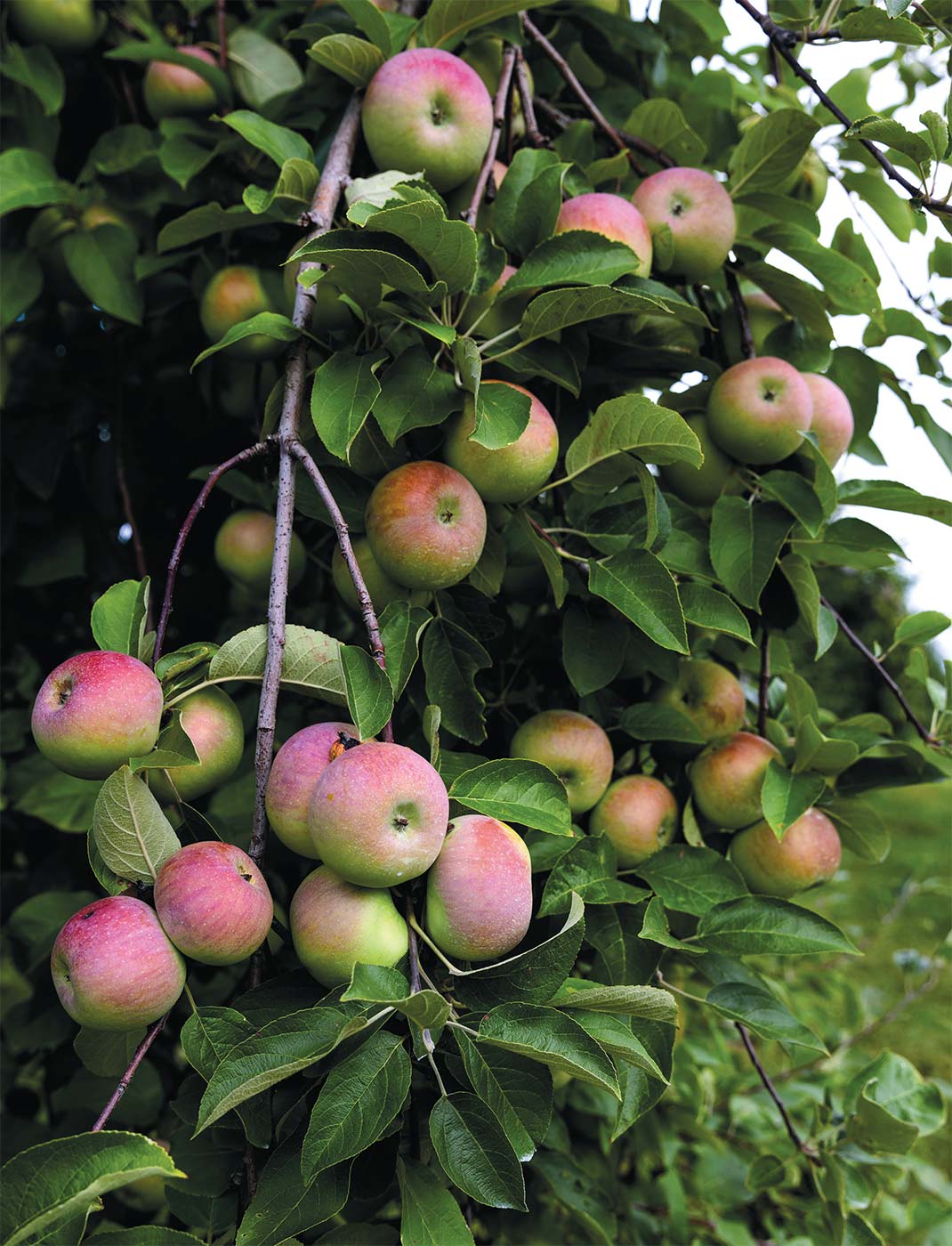Old Friends at Riamede Farm
Over time, apples, like hemlines, cycle in and out of fashion. Modern apple-growing techniques allow for a quicker start to fruit production, giving orchardists greater flexibility to change varieties to fit the times. But old apple trees, the ones that grow to over 25 feet and are depicted on the pages of our favorite children’s books, constitute a much longer time commitment—one that spans generations. At Riamede Farm in Chester, owner Ashley Asdal works to retain the farm’s beloved old apple trees while navigating the logistical and economic realities of running a modern pick-your-own orchard in the Garden State.
Take, for example, the Red Delicious apple. For many of us, that name evokes memories of a mealy apple with tough, bitter skin. But in 1943, when Lowry T. Mead and his wife, Maria, purchased Oscar Gardner’s mixed poultry-dairy-fruit farm, the Red Delicious was wildly popular, and marketed by Stark Bros. Nursery, owners of the original Red Delicious tree, as being “slightly tart with an indescribable, never-to-be-forgotten tang” and “a savory, luscious, clinging aroma, bearing the faintest suggestion of old wine.”
Naming their new farm Riamede—reportedly the combination of “Ria,” Mead’s nickname for his wife, and “mede,” an Old English term for a meadow—Mead planted orchards of apples, peaches, and other fruits. He chose popular apple varieties, including Red Delicious, Baldwin, Cortland, Golden Delicious, McIntosh, Paragon, Rome Beauty, and Stayman Winesap to sell to customers who came to the farm to purchase baskets and gift boxes of fruit. In his ads, Mead touted the quality, size, and flavor of his apples—for which he won several statewide awards, including second place for his Red Delicious apples at the 1961 State Farm Show.
Still standing in the orchard at Riamede, those hulking, gnarled, deeply rooted 70-plus-year-old Red Delicious trees produce apples that Asdal and her farm manager, Jamie Bourgeois, say have a more tender skin and deeper, rounder, more complex flavor than the modern supermarket Red Delicious—contradicting the notion that apple varieties deliver a consistent eating experience.
Variety, in fact, is only one aspect of apple flavor and texture, which can also be affected by the weather, location and age of the tree, timing of harvest, and orchard management practices. Less scientific, but equally important, is the impact that anticipation and nostalgia have on our perception of flavor, such as the emotional and physical connection built through the annual fall ritual of pick-your-own apple harvesting.
Jeanette Post purchased Riamede Farm from Mead in the late 1960s and continued his marketing model of selling pre-picked fruit at the farm. Then, in 1974, her McIntosh apples ripened early. Post sent out a request for a picking crew and was told it would be several weeks before a crew was available. Facing the loss of her crop, she ran an ad inviting the public to come pick. Her timing was perfect, allowing her to catch the wave of enthusiasm for pick-your-own outings that began to take hold in New Jersey in the late 1970s. As a result, Riamede is one of the longest-operating U-pick orchards in the state.
Singular focus
Unlike other orchards that expanded their pick-your-own offerings to include an array of vegetables and small fruits, Post stayed focused on apples, relying on the ambience created by Mead’s old trees to differentiate her pick-your-own experience from that of other farms. When Post’s daughter Debbie took over the farm in 2000 she kept those old trees, which still numbered over 500. While inefficient from an agricultural perspective, Post understood that they gave the farm an authentic, old-fashioned ambience, which, she noted, set Riamede apart from other “agri-tourist farms.” Her marketing promotions promised “no petting zoos, pony rides, Astro jumps or arcade games … just a peaceful, quiet, olde-time apple orchard with a pumpkin field out back.”
Asdal has continued that tradition—as well as the “without the carnival” marketing pitch—since purchasing the farm following a 15-year career in the Navy. Asdal had come home to Chester seeking a new career path based on local food. Her mother connected her with Post, a personal friend, who was ill and looking for a successor to take over Riamede, which Asdal did in 2021.
Like Post, Asdal is committed to retaining many of Mead’s old trees and the farm’s pick-your-own tradition. But unlike Post, who took over her parents’ farm after retiring from a successful banking career, Asdal must expand the farm’s offerings so that the farm provides an income for her young family as well as that of Bourgeois, who also lives on the farm with his wife and children.
To plan and execute that expansion, she relies heavily on the farming skills and institutional knowledge of Bourgeois, who grew up on a South Jersey vegetable farm and has managed the orchards at Riamede since 2008. Complementing his skill set, Asdal adds a focus on service and education combined with the leadership skills she acquired in the Navy—skills that make her comfortable operating in uncertainty and in managing people. “I was an officer in the Navy,” Asdal says. “Most of an officer’s job is not in technical prowess. It’s in getting a job done—bringing people together and helping them understand what their goal is, what their mission is.”
“It’s been a couple of years of really serious transition for both Jamie and me,” she continues. “I know how to lead. I know how to make decisions. But I don’t know how to farm. I am learning as fast as I possibly can—all to be a good partner to Jamie. I don’t want to create a lot of work. I want to create value.”
Value, beauty, and experiences
Decisions and challenges are plentiful in agriculture, especially for farmers who invite, and rely on, the public to harvest on the farm. Along with the make-or-break need for good weather on fall weekends, a major challenge in pick-your-own is ensuring a good customer experience while managing the flow of customers throughout the orchards—something Riamede addresses with signage, paths, fencing, weekend wagon rides that take pickers out to the orchard, and greeters who help direct customers to the specific apple varieties that will meet their needs.
“We have a person sitting at the gate, a person sitting at the top of the hill, and a person at the wagon stop—all of whom have the tasting notes and are trying to reach each customer and say ‘What do you want? Oh, are you baking? Go to these trees. Go to that tree,’” Asdal says. “It’s a lot of information that we want to impart so that you’re going to enjoy what you’re picking.”
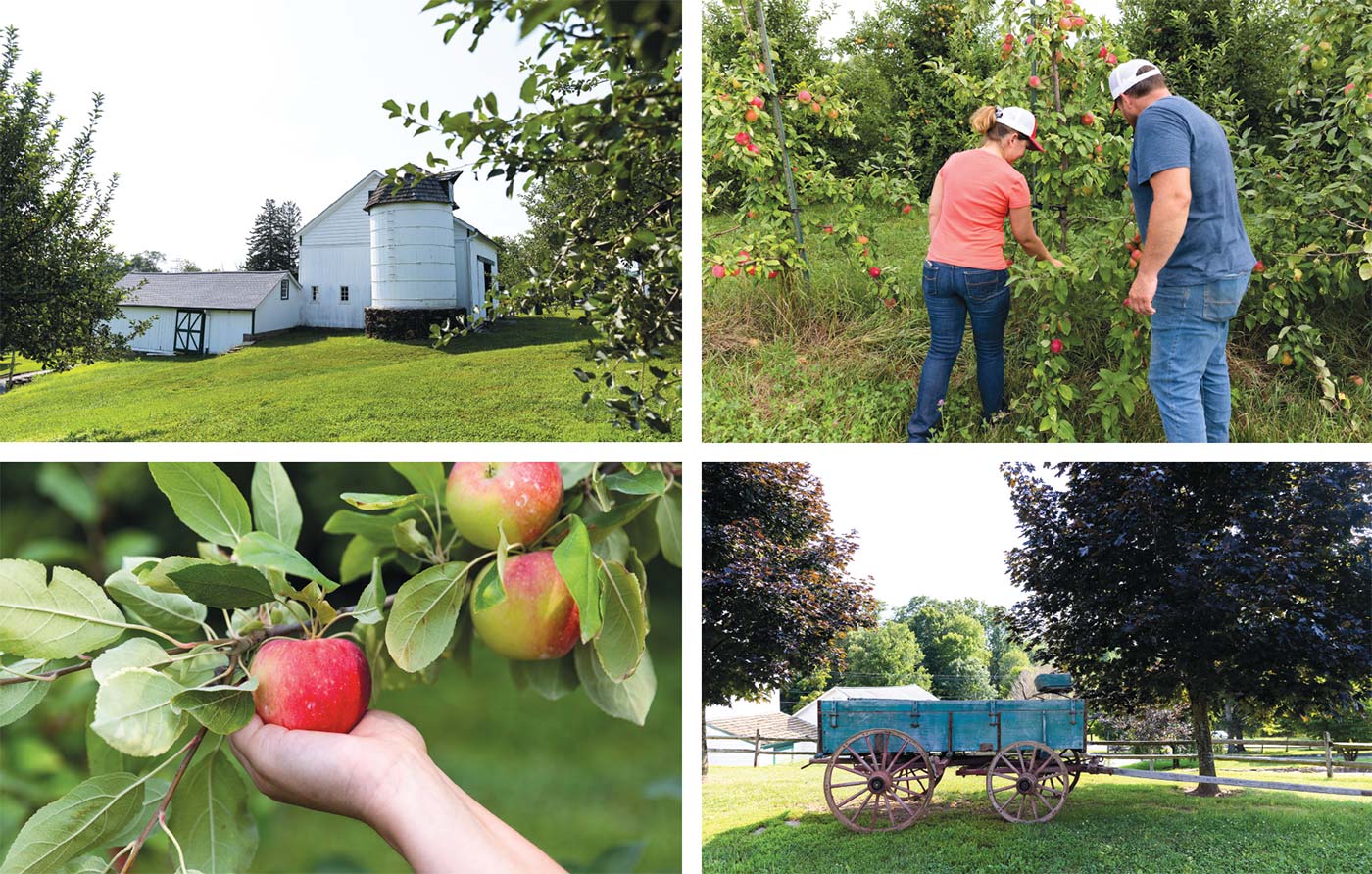
HAVING A WIDE SELECTION OF APPLE VARIETIES, RIPENING AT DIFFERENT TIMES, IS ESSENTIAL TO ENSURING THAT THERE ARE APPLES TO PICK THROUGHOUT THE SEASON.
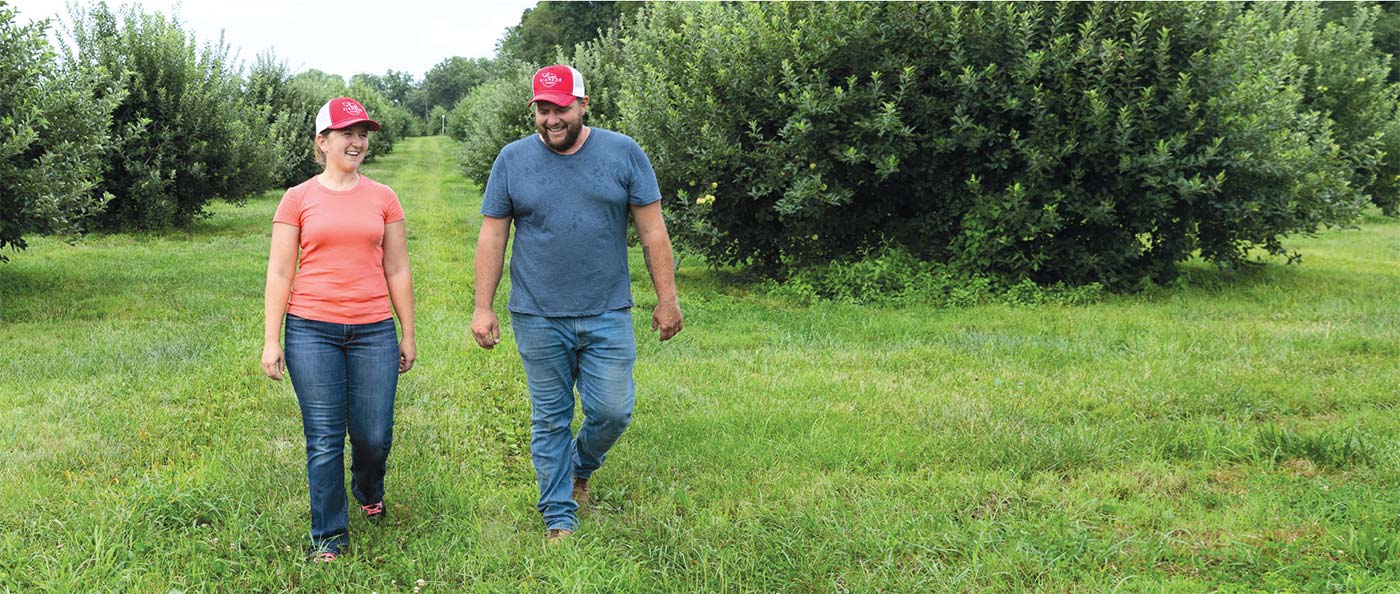
Having a wide selection of apple varieties, ripening at different times, is essential to ensuring that there are apples to pick throughout the season. So too is opening and closing orchard blocks to direct customers to apples that are at their flavor peak. “You want to make sure they’re ripe enough, that they have the right flavor,” Bourgeois says. “We’re really selling flavor.” Asdal adds that they close sections once the apples have gone too far past their flavor peak, even if many remain unpicked.
When picking from Mead’s old trees, customers need to be encouraged to pick the apples growing deep inside the branches, which are harder to find because they don’t gain color like those on the outside of the tree. “Sunlight doesn’t penetrate inside the tree, which is part of the reason why they don’t color up and people don’t pick the inside,” Asdal says. She notes that even though color doesn’t impact the flavor, it’s hard to convince customers of that. “If you were looking at a tree full of red apples and then there were green apples on the inside,” she adds, “you wouldn’t pick the green apple on the inside. You’d pick the red apple.”
As was the accepted practice in his time, Mead planted his orchard in long, straight rows with 40-foot spacing between the trees. When an old tree dies, Bourgeois plants several trees aligned in the row within that opening. Those trees are on large semi-dwarf rootstock, which, because rootstock determines the size of the tree, means they will grow to be close to 20 feet tall—maintaining the farm’s ambience. “We’re trying to interplant things that ripen at the same time so when we’re picking this section, it’s all ready,” Bourgeois says. “To keep the old trees, but then increase the yield per acre.”
In contrast, the dwarfing and semi-dwarfing root-stocks used by Post to replant sections of the orchard permit trees to be planted much more closely together, which allows for many more trees per acre and, at a final height of six to 14 feet, much easier picking. It also means a shorter length of time between planting and first harvest, facilitating the faster introduction of new apple varieties. Bourgeois and Asdal use these rootstocks to incorporate more tree density into certain parts of the orchard. The high-density plantings are particularly helpful for making sure there are adequate apples available during October’s peak picking weekends.
There are many reasons that people cite for choosing to visit pick-your-own apple orchards. Some have to do with quality, such as freshness and flavor. Others are about the experience, such as being out in the countryside in fall, enjoying a shared experience with friends, or upholding longstanding family traditions.
For farmers, getting people out on the farm helps to connect the public with the value and beauty of local agriculture. It also gives Asdal and Bourgeois the opportunity to talk directly with customers about seasonality, annual variability in flavor, and the value of using sensory experience to choose apples, rather than relying solely on varietal names and one’s associated memories. Overcoming those memories can be especially challenging to the goal of preserving Riamede’s old trees, which include varieties, such as Red and Golden Delicious, that are now linked in many people’s minds with experiences of biting into visually perfect fruit that is insipid and uninteresting. “We have to fight the stigma that Golden Delicious is boring,” Bourgeois says. “Try one off one of our old trees. It’s a completely different flavor.”
To further counter assumptions and biases about flavor, Asdal created a Wednesday Apple Club for customers who want to do a deep dive into the orchard’s 51 apple varieties. The club is an opportunity to taste varieties as they come into season, compare the same variety grown on different rootstocks, experience whether visual aspects such as color and russeting impact flavor, and note how the taste of a single variety evolves throughout the fall.
As Bourgeois tends to the farm, Asdal focuses much of her energy on improving the on-farm experience for customers as well as expanding the farm’s offerings. This includes developing culinary and educational events, broadening the range of local products in the farm store, and extending Riamede’s seasonal range slightly by adding earlier items, such as peaches and pick-your-own vegetables.
Apple legacy
Still, apples remain the heart of the farm, and Asdal is staking the farm’s future on Post’s vision that a portion of the apple-picking public is seeking the experience and beauty of spending a day in the countryside among large, old trees. “I have a substantial deference to Debbie’s vision, because I think it was right,” Asdal says. “This farm is not going to be like everyone else. There’s plenty of people who can do a great agri-tainment thing. We’re really interested in research, and in people who are part of this apple community. I think that’s our breakout—that we’re providing that experience.”
Riamede’s apple selection has increased tremendously since Mead’s time, encompassing old, classic, and modern varieties grown using a range of planting strategies. “This farm is a museum to American apple growing,” Asdal says. “It is a museum of apple varieties that were popular in certain periods. It is a museum of apple-growing techniques.”
“Think about how many people’s hands and livelihoods have been part of these trees,” she adds—echoing both her commitment to continuing the legacy created by the Meads and Posts and her understanding that history and storytelling can be intangible, yet powerful, enhancers of flavor.
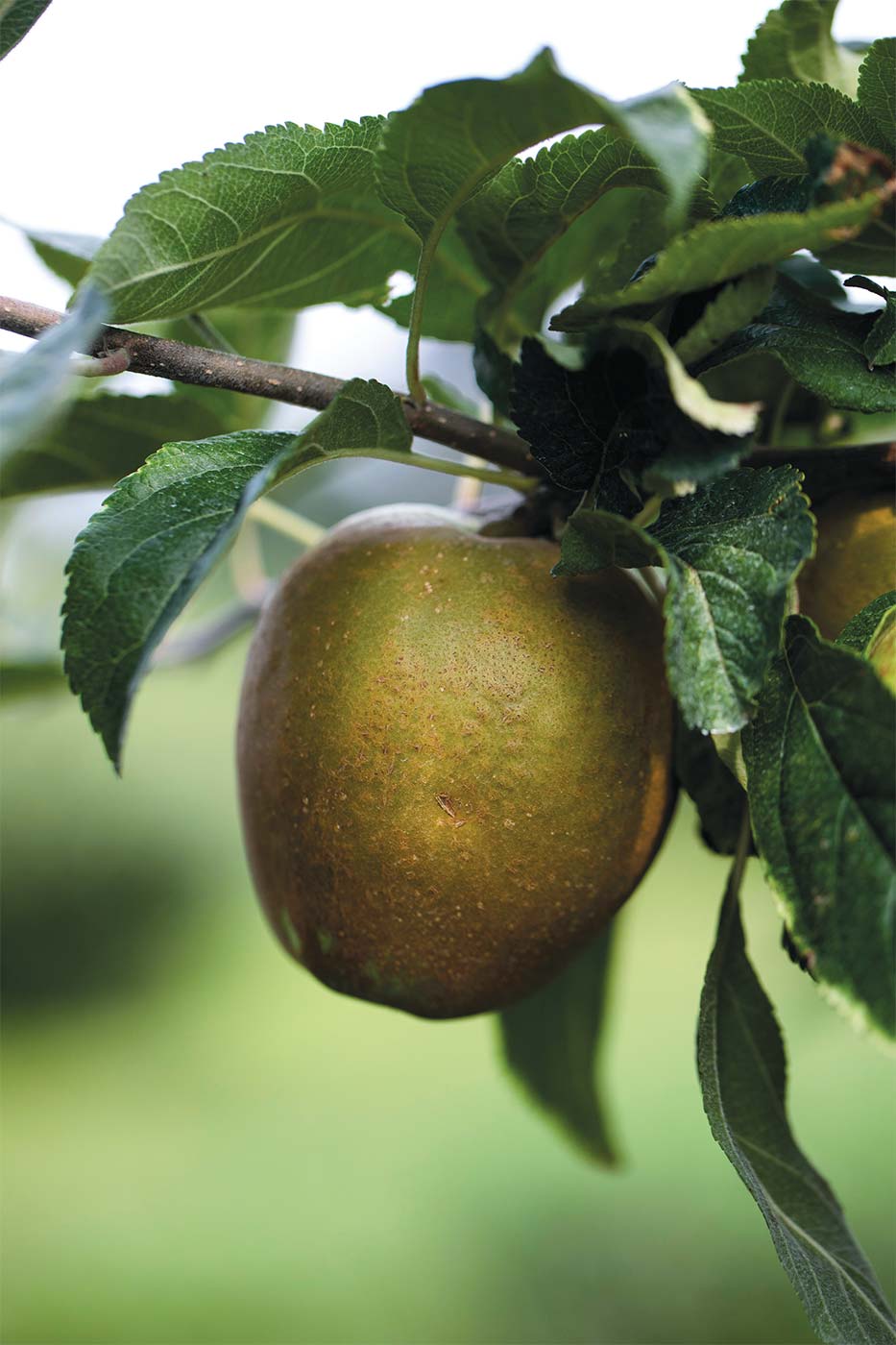
DECISIONS AND CHALLENGES ARE PLENTIFUL IN AGRICULTURE, ESPECIALLY FOR FARMERS WHO INVITE, AND RELY ON, THE PUBLIC TO HARVEST ON THE FARM.
RIAMEDE FARM
122 Oakdale Rd.
Chester
riamedefarm.com
A 68-acre farm with 30+ acres in apple trees and 10 acres of assorted pick-your-own vegetables. 51 apple varieties, ranging from heirloom to modern.
For pick-your-own: Call 908.879.7762 for a recorded message or visit the farm map on the Riamede website to find out what’s ready for picking. Riamede apples are also available in the farm store (not all varieties are available pre-picked) along with produce, cut flower bouquets, local foods from Jersey Girl Cheese, Mazur Chocolates, Kilhaney Pickles, Chaos & Crumbs, Chumami Chili Oil, Das’ Creamery, Jersey Barnfire Hot Sauce, and more.
Bloom & Bramble: Jess and Jamie Bourgeois lease ground at Riamede to grow flowers for their specialty cutflower business, which uses sustainable floristry practices to create nature-inspired arrangements of local, seasonal flowers—especially varieties not found in typical florist shops. Bouquets are available in the Riamede Farm Store. Custom arrangements are also available, as well as public and private floral design workshops. Jess specializes in dahlias, which she also breeds.
localbloom.com
Special Events: Riamede runs on-farm events throughout the year including seasonal and holiday celebrations, educational events, orchard workshops, live music, barn dances, and special farm-to-table dinners.
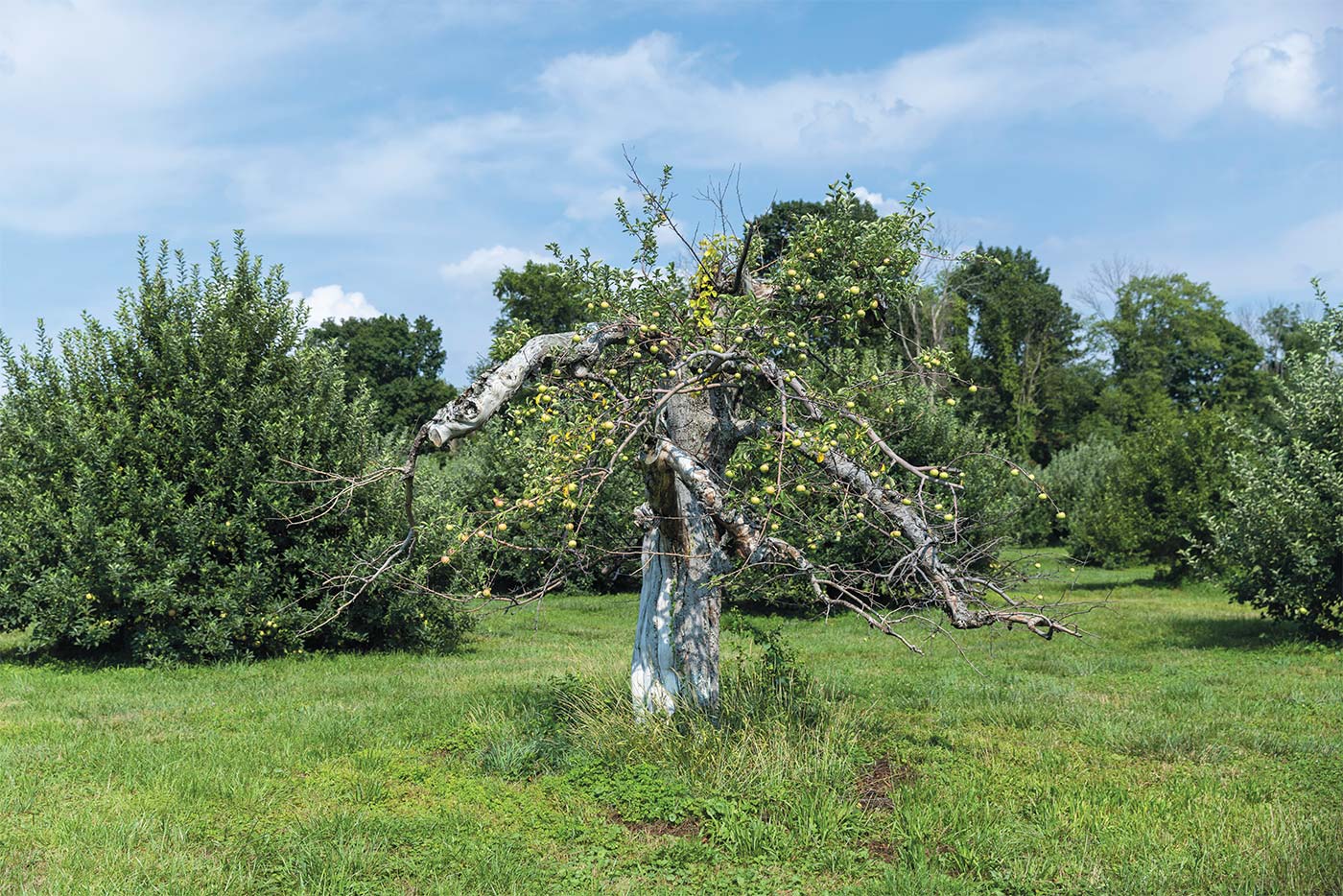
APPLE VARIETIES
GROWN AT RIAMEDE FARM
- Arkansas Black
- Baldwin
- Banana Golden
- Braeburn
- Cortland
- Cox’s Orange Pippin
- Crab Apple
- Crimson Crisp
- Empire
- Freedom
- Fuji
- Fuji/Beni Shogun
- Gala
- Galarina
- Ginger Gold
- Gold Rush
- Golden Delicious
- Granny Smith
- Honeycrisp
- Ida Red
- Jonafree
- Jonagold
- Jonathan
- King David
- Liberty
- Macoun
- McIntosh
- Mollie’s Delicious
- Mutsu
- Mystery
- Northern Spy
- Paragon
- Pixie Crunch
- Premier Honeycrisp
- Red Chief
- Red Cortland
- Red Delicious
- Red Max
- Rhode Island Greening
- Rome Beauty
- Royal Court
- Royal Red Honeycrisp
- Ruby
- Sansa
- Smoothie
- Suncrisp
- Sundance
- Turley
- Winecrisp
- Winesap
- Zestar
Pick-Your-Own Apples: 13 Favorite Orchards
Picking apples in clear, crisp air is one of fall’s great joys. Harvesting schedules depend upon weather and supply conditions, so call to confirm that farms are open or check their social media. Then lace up a pair of old shoes, head to the apple trees, and pick enough for a pie (or two). —Marisa Procopio
ALSTEDE FARMS
1 Alstede Farms Ln., Chester
908.879.7189
alstedefarms.com
Sweet, tart, juicy, zesty—with over 50 varieties, this farm has apple flavors and profiles to please everyone.
BONACORSI FAMILY FARM
1137 Croton Rd., Flemington
bonacorsifamilyfarm.com
Pick tried-and-true favorites, a few heirloom varieties you’ve never tasted, or a combination of the two at this farm.
EASTMONT ORCHARDS
321 County Rd. 537, Colts Neck
732.542.5404
eastmontorchards.com
Eastmont’s first trees were planted over a 100 years ago, producing apples for New York City customers. Today, they’re all pick-your-own.
GIAMARESE FARM & ORCHARDS
155 Fresh Ponds Rd., East Brunswick
732.821.9494
giamaresefarm.com
Family-owned since 1941, this award-winning farm focuses on pick-your-own and has an extensive retail market.
HILL CREEK FARMS
1631 State Hwy. 45, Mullica Hill
856.223.0028
hillcreekfarms.com
An on-site bakery, special-event venues, wine garden, and farm market are features at this family-owned and -operated farm.
JOHNSON’S LOCUST HALL FARM
2691 Monmouth Rd., Jobstown
609.353.9000
johnsonslocusthallfarm.com
Pick apples at this 325-acre, 17th century farm, then visit the fall gift shop and country store for apple-cider doughnuts.
MACKEY’S ORCHARD
284 County Rd. 519, Belvidere
908.475.1507
mackeysorchard.com
A hayride and a mountaintop view of the Delaware River are included during an apple harvesting visit to this farm.
MELICK’S TOWN FARM
19 King St., Oldwick
908.439.2318
melickstownfarm.com
Aft er picking fruit amid 50 acres of dwarf apple trees, try this farm’s freshly pressed, cold-pasteurized cider.
MOOD’S FARM MARKET
901 Bridgeton Pk., Mullica Hill
856.478.2500
moodsfarmmarket.com
Hayrides here include a ride to the orchard, picking a three-pound bag of apples, a drink of apple cider, and an apple-cider doughnut.
RIAMEDE FARM
122 Oakdale Rd., Chester
908.879.7762
riamedefarm.com
This 68-acre farm has 30+ acres in apple trees offering 51 apple varieties, ranging from heirloom to modern. Also 10 acres of assorted pick-your-own vegetables.
STILES FARM AND NURSERY
172 S. Delsea Dr., Cape May Court House
609.600.7939
facebook.com/stilesupickblueberries
The friendly, knowledgeable staff make the apple-picking experience on this beautiful, family-run farm even better.
STONY HILL FARMS
15 North Rd., Chester
908.879.2908
stonyhillfarms.com
Hayrides—plus a playground, corn maze, and other kid-friendly activities—add to the fun of harvesting apples here.
TERHUNE ORCHARDS
330 Cold Soil Rd., Princeton
609.924.2310
terhuneorchards.com
Located on 250 acres, this farm is a family favorite for pick-your-own as well as for visiting the farm animals and store.
TREELICIOUS ORCHARDS
135 Karrville Rd., Port Murray
908.852.7191
treeliciousorchards.com
Bring a picnic lunch when you pick apples at this hillside orchard; afterward, visit their farm store for a sweet treat.
VON THUN FARMS
438 Route 57 W., Washington
732.329.8656
vonthunfarms.com
This farm grows several varieties of apples within two orchards for pick-your-own fun, along with activities every fall weekend.
WIGHTMAN FARMS
1111 Mt. Kemble Ave., Morristown
973.425.9819
wightmanfarms.com
Enjoy apple-picking at this century-old farm, then stop into the farm market to pick up lunch, cider, ice cream, and more.


